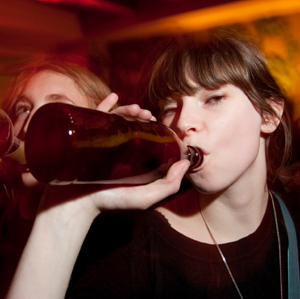I regularly scan the learned journals for food-, diet-, and nutrition-related articles which might help shed light on where we stand in our collective quest for longer, healthier, happier lives. Lately, I’ve noticed a heavy emphasis on new research about the effects of Alcohol on health. This week, Musings asks, “Why?”
 Seems folks want so strongly to have their fave foods declared ‘safe’ or even
Seems folks want so strongly to have their fave foods declared ‘safe’ or even
‘beneficial’, that they’ll continue to study the living daylights out of them
until some research project or another produces the result they want.
What’s up with that?
Just this week, for instance, there are no fewer than three new reports on Alcohol-related studies in the food- and nutrition-related indices of the world’s leading, legit learned journals:
More than one drink a day may raise high blood pressure risk in adults with Type 2 diabetes
Abstract Excerpt: Drinking eight or more alcoholic beverages a week may increase the risk of high blood pressure (also called hypertension) among adults with Type 2 diabetes, according to new research published […] in the Journal of the American Heart Association.
Research Team Member quote: “This is the first large study to specifically investigate the association of alcohol intake and hypertension among adults with Type 2 diabetes,” said Senior Study Author Dr. Matthew J. Singleton of Wake Forest University. “Previous studies have suggested that heavy alcohol consumption was associated with high blood pressure, however, the association of moderate alcohol consumption with high blood pressure was unclear.”
Binge-drinkers’ brains have to work harder to feel empathy for others
Abstract Excerpt: The binge-drinking participants [in the study] struggled more than their non-binge-drinking counterparts when trying to adopt the perspective of another person experiencing the pain: they took more time to respond and the [MRI] scans revealed that their brains had to work harder – to use more neural resources – to appreciate how intensely another person would feel pain.
Binge drinking [was] defined [for purposes of the study] as consuming more than 60 g of pure alcohol – (equivalent to about three quarters of one bottle of wine, or 2½ pints of lager) on at least one occasion in the past 30 days. About 30% of all adults (over 15 years of age) who drink alcohol in UK and France meet this criterion.
Research Team Member quote: Professor Theodora Duka from the University of Sussex [UK] said: “Reduced empathy in binge drinkers may facilitate drinking as it can blunt the perception of suffering of self or others during a drinking session. We have shown with this study that dysfunction associated with binge drinking is even more extensive than previously known.”
Japanese sake: the new pick-me-up? Yeast strain makes fatigue-fighting ornithine
Abstract Excerpt: Fans of sake, the traditional Japanese alcoholic beverage, may have even more reason to enjoy it now: Japanese scientists have discovered that a mutant strain of sake yeast produces [produces 10 times] the amount of the amino acid ornithine compared with the parent yeast strain. […] Ornithine is a non-protein-making amino acid and a precursor to two amino acids – arginine and proline. It has been found to perform several physiological functions, such as reducing fatigue and improving sleep quality.
Research Team Member quote: Dr. Hiroshi Takagi, a Corresponding Author of the Study Report, explains: “We wanted to obtain sake yeast strains with improved ethanol tolerance. During sake fermentation, the yeast is exposed to high concentrations of ethanol, which impedes yeast cell growth, viability and fermentation. Increased ethanol tolerance in sake yeast strains could improve ethanol production and reduce fermentation time.”
Instead, they found a new non-GMO, naturally-mutated strain of Sake yeast that produces high levels of ornithine.
My takeaway
Whereas most other popular targets for biomedical research (eg.- cardiovascular disease, obesity, type 2 diabetes, etc.) generally seek to demonstrate whether a certain behaviour, food or chemical compound will increase or decrease the risk of contracting the target disease, research into Alcohol consumption often focuses on some obscure connection between ancient and mysterious compound and various of its effects (eg.- hangovers). Also, Alcohol research (these day, at least) concentrate on variations of the harmless vs. harmlful question, with researchers acting – contrary to their traditional roles as impartial observers – almost crossing a crucial line and coming off as either cheerleaders or doomsayers for the substance or behaviour at the focus of their research.
Such is the power of iconic substances such as Alcohol, Caffeine (Coffee, Tea) or Dietary Cholesterol (Eggs, Cheese, Red Meat etc. ) to avoid absolute vilification or vindication in the opinions of even the most serious scientists. Seems folks want so strongly to have their favourite foods definitively declared ‘safe’ or even ‘beneficial’, that they’ll continue to study the living daylights out of them until some research project or another produces the result they want. But, then, yet another project comes back claiming to have revealed proof to the opposite.
As with most of the really important questions in life, we all must use our own observations and experience – not to mention common sense – to make up our minds about the issues and act accordingly.
~ Maggie J.

